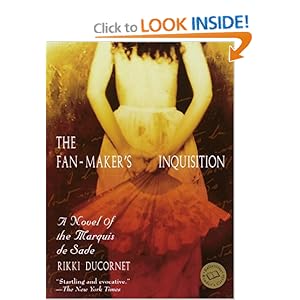
Following from Rikki Ducornet's priceless work "The Fan-Maker's Inquisition," in honor of Bastille Day, and the art of remembering.
In this passage, the Marquis de Sade is recalling the horrors of the French Revolution, and the perplexing fact that he has been imprisoned and is awaiting death, in a cell which is above the guillotine, so that daily he sees 'enemies of the state' being killed in the manner that eventually awaits him, for the crime of words, for the crime of setting an atyplical moral example of personal tastes and individual predilections.
--
Amie--
Up here in my eyrie I consider the facts, those five days in September when Satan, disguised as a citizen, ruled Paris. And if the bodies of the victims are rotting away in their beds of lime and straw, if the courtyards are washed clean of blood and the gardens weeded of eyes and teeth, if, already, the world--so always eager to forget, is forgetting, I, Donatien de Sade, remember.
I remember how a vinegar-maker named Damiens cut the throat of a general before cutting out his heart, and how he put it to his lips--Ah! The exemplary Mayan gesture! how a flower girl was eviscerated and the wound made into the hearth that roasted her alive; how a child was told to bite the lips of corpses; how one Mademoiselle de Sombreuil was given a glass of human blood to drink; how the face of the king's valet was burned with torches; how one Monsieur de Maussabre was smoked in his own chimney; how the children incarcerated in Bicetre were so brutally raped that their corpses were not recognizable; and how the clothes of the victims taken from the corpses were carefully washed, mended, pressed and put up for sale! The Revolution, ma mie, shall pay for itself. And I remember, helas, I shall never forget, how my cousin Stanislas, that gentle boy, was thrown from a window the night of August tenth; how his body, broken on the street, was torn apart by the crowd. All night the bells sounded--I hear them even now. The bells of massacre. The bells of rage. "What do you expect?" Danton--all howl and black bile--said to the Comte de Segur. "We are dogs, dogs born in the gutter."
Already, although blood continues to spill and the trees of Paris are daily watered with tears, there are those who would say all this never happened, that the trials and executions are orderly, silent, and fair; that such stories--the head of Madame de Lamballe exhibited on a pike, of Monsieur de Montmorin impaled and carried to the National Assembly for display--are false, the fables so dear to the "popular imagination." Well, then, I ask you: If this is so, why am I, whose imagination is clearly as "popular" as the next man's, why am I still locked away?
...Which reminds me, I ate all the pastilles. I shall lose my teeth; no matter. Like Danton, "I don't give a fuck." What will be left to bite into? Without its kings, France will be as unsavory as America. France, too, is to be run by merchants. Merchants! I have met some--a good number--in jail. Their notion of beauty is forgery, their idea of virtue, counterfeit; their hearts are in deficit; their interests simple; their pricks as dog-eared and limp as old banknotes. Welcome to the New Century! We shall tumble into it as frightened rats tumble into a sewer. And the horrors that will be done in the name of Prosperity will make all the corrupt castles of my mind look like little more than the idle thoughts of a cloistered priest--and the excesses of Landa among the Maya of the Yucatan, a mere drop of oil in a forest on fire.
Speaking of fire: Today in my idleness I imagined a fan that could be ignited by a tear. Can such a thing be?